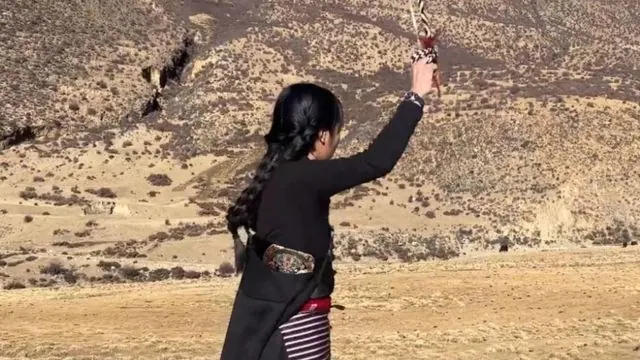When trains with tourists pass, the traditional stone-throwing ropes called “urduo” are used to express disapproval of the staged tours.
by Lopsang Gurung

“Genocide tourism” is an expression used by the Uyghurs to oppose tours to Xinjiang where tourists visit villages where everybody smiles and dances under the watchful eye of the Chinese authorities. The reality is different, but tourists do not see it. It is the reality of concentration camp, repression, and physical and cultural genocide.
Tourism in Tibet is not much different. Domestic Chinese and some international visitors are only shown what the CCP wants to show. They may spend several days in Tibet, visit some monasteries, photograph some monks, and not understand at all that a cultural genocide is happening there, with Tibetan culture systematically denied and Buddhist religion allowed only if it accepts to serve as a propaganda mouthpiece of the regime and the Chinese occupation.
Protesting this state of affairs is difficult and exposes the protesters to long jail sentences. Or perhaps you will not go to jail if you are a child?
Children in the area around the prefecture-level city of Nagku, in Northern Tibet, have devised an original and moving form of protest. They use the traditional “urduo,” a rope or whip made of yak or goat hair. It is used by herdsmen to drive cattle but also to throw stones to show the road to the livestock or scare away wild animals.
The herdsmen’s children take the “urduo” when trains with tourists pass their area and whip the passing trains or throw small stones. They do not intend to hurt anybody; they just want to tell the tourists that staged tours are not welcome.
The CCP has now warned parents that they will be held responsible for the behavior of their children. It is a small incident, but it shows that even children share the indomitable spirit of the Tibetan resistance.
Source: BITTER WINTER












